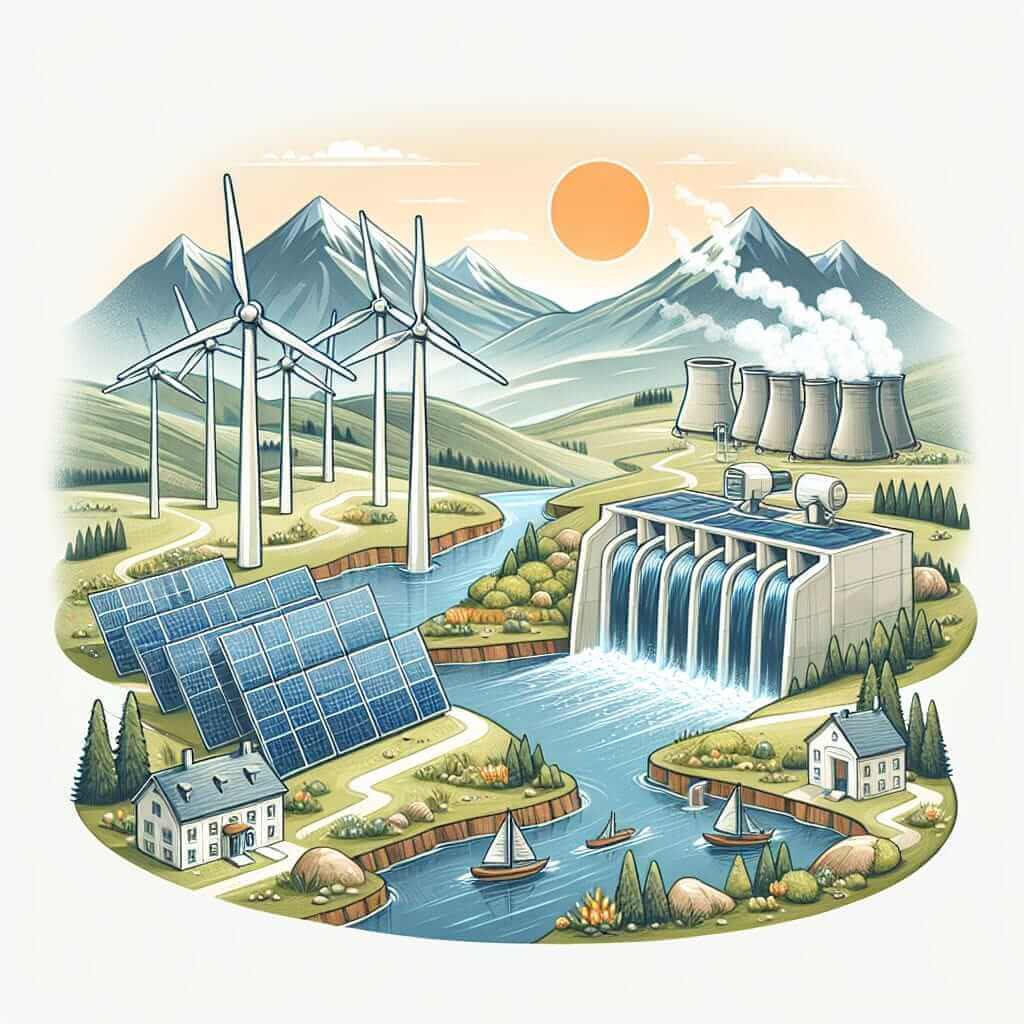The IELTS Reading section is a critical component of the IELTS exam, designed to assess your ability to read and comprehend complex texts. One of the trending topics that may appear in your IELTS Reading section is renewable energy and its impact on global trade agreements. This topic is not only timely but also resonates with the increasing global focus on sustainability and green energy. Given its relevance, there is a high likelihood that similar themes may appear in future IELTS exams.
Reading Passage: Renewable Energy and Global Trade Agreements
Passage Type: Medium Text
Renewable energy, encompassing sources such as solar, wind, hydro, and geothermal power, has become a cornerstone of global efforts to combat climate change. As nations worldwide commit to reducing their carbon footprints, the transition to renewable energy is also reshaping global trade dynamics.
Previously, fossil fuels like oil and coal dominated the landscape of international trade, creating a dependency that often led to geopolitical tensions. However, the rise of renewable energy technologies is pivoting global trade towards a more diverse and decentralized energy market. Countries endowed with abundant renewable resources are now leveraging these assets to foster trade relations and enhance their energy security.

One significant change is observable in the trade agreements and collaborations forged around renewable energy technologies. For instance, the recent trade agreement between the European Union and China aimed at reducing tariffs on solar panels exemplifies the shifting priorities in global trade policies. Such initiatives are not only beneficial for the environment but also help to lower the costs of renewable technologies, making them accessible to a broader audience.
However, this shift does not come without challenges. The disparity between developed and developing nations in terms of technological advancement poses a challenge for equitable trade relations. Developed countries, with their advanced technological infrastructures, have an edge in producing and exporting renewable technologies. Conversely, developing nations may struggle to keep pace, potentially leading to new forms of economic imbalance.
Moreover, the focus on renewable energy necessitates substantial investments in infrastructure and innovation. Governments are allocating significant resources to research and development, aiming to create more efficient and cost-effective renewable technologies. This trend is fostering a new wave of international collaborations, where countries pool resources and expertise to accelerate advancements.
In conclusion, renewable energy is undeniably influencing global trade agreements, paving the way for a more sustainable and interconnected world economy. As renewable energy continues to grow, its impact on global trade dynamics will likely expand, shaping the future of international relations and economic policies.
Practice Questions
Multiple Choice
-
What has become a cornerstone of global efforts to combat climate change?
- a) Fossil fuels
- b) Renewable energy
- c) Nuclear energy
- d) Natural gas
-
What was a significant source of geopolitical tensions in the past?
- a) Renewable energy
- b) Geothermal power
- c) Fossil fuels
- d) Solar panels
Identifying Information (True/False/Not Given)
-
The rise of renewable energy technologies is reducing dependency on fossil fuels.
- True
- False
- Not Given
-
Trade agreements involving renewable energy are primarily focused on reducing tariffs on wind turbines.
- True
- False
- Not Given
Matching Information
- Match the statements below with the corresponding paragraph (A, B, C, D).
- i. Trade agreements targeted at renewable energy technologies
- ii. Investments needed in infrastructure
- iii. Challenges faced by developing nations
- iv. Historical dependency on fossil fuels
Sentence Completion
- Renewable energy is reshaping global trade by creating a more __ market.
Short-Answer Questions
- What is fostering a new wave of international collaborations?
Answer Key and Explanations
- (b) Renewable energy – It is directly stated in the first sentence of the passage.
- (c) Fossil fuels – The passage mentions that fossil fuels like oil and coal dominated and created geopolitical tensions.
- True – Highlighted in the second paragraph.
- False – The passage mentions solar panels specifically, not wind turbines.
-
- i. C
- ii. D
- iii. B
- iv. A
- Decentralized – The passage explains how the renewable energy market is diversifying.
- Investments in research and development – As mentioned in paragraph D, governments are pooling resources to innovate.
Common Mistakes and Tips
- Overgeneralization: Students often make broad assumptions without considering the specific details provided in the text. Always refer back to the passage for accuracy.
- Misinterpreting Question Types: Distinguishing between True/False/Not Given and Yes/No/Not Given can be tricky. Remember, “True/False/Not Given” questions are about factual accuracy, while “Yes/No/Not Given” questions deal with the writer’s opinions and claims.
- Skimming and Scanning: Effective skimming and scanning can save time. Focus on keywords and headings to locate information quickly.
Vocabulary Highlights
-
Footprint (ˈfʊtˌprɪnt) – Noun: The impact or impression of one’s actions.
- “Reducing their carbon footprint.”
-
Substantial (səbˈstænʃəl) – Adjective: Of considerable importance, size, or worth.
- “Substantial investments in infrastructure.”
-
Equitable (ˈekwɪtəbl) – Adjective: Fair and impartial.
- “Equitable trade relations.”
Grammar Highlights
-
Complex Sentences: The use of subordinating conjunctions (e.g., since, because, although) enhances the sophistication of writing.
- Example: “As nations worldwide commit to reducing their carbon footprints, the transition to renewable energy is also reshaping global trade dynamics.”
-
Passive Voice: Useful for emphasizing the action rather than the doer.
- Example: “Trade agreements are being forged around renewable energy technologies.”
Words of Wisdom
To excel in the Reading section of IELTS, it’s crucial to practice regularly with a range of texts. Focus on improving your skimming and scanning techniques, understanding different question types, and expanding your academic vocabulary. Time management is essential—practice under timed conditions to simulate the actual exam.